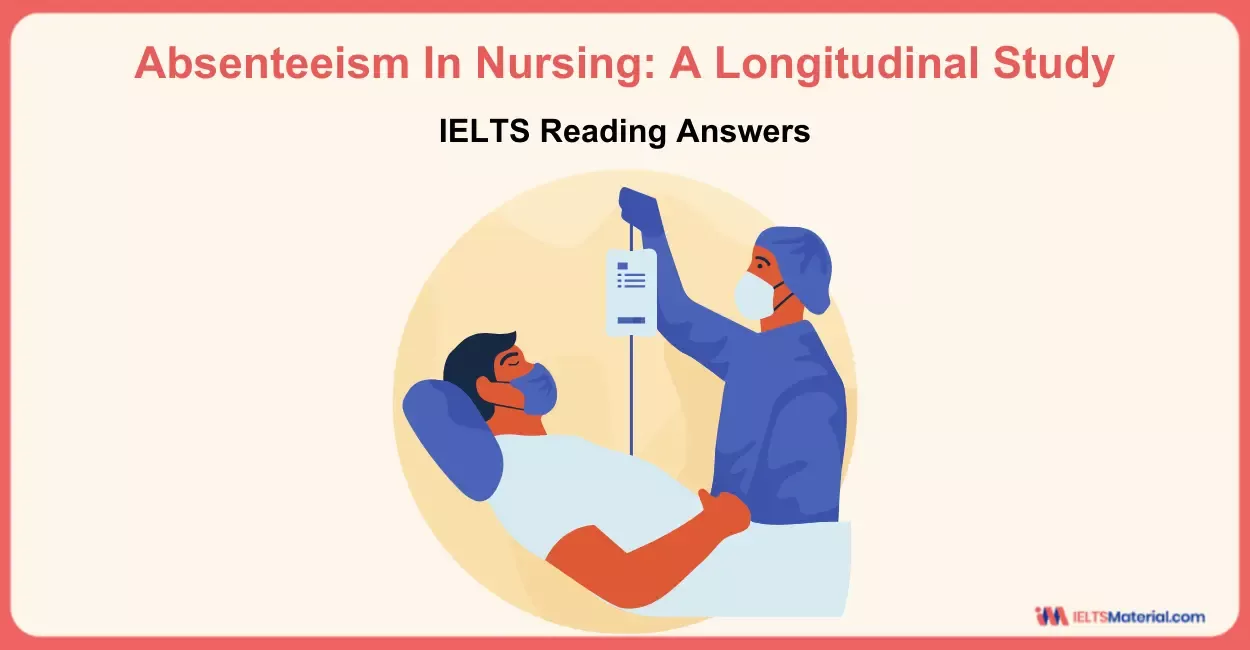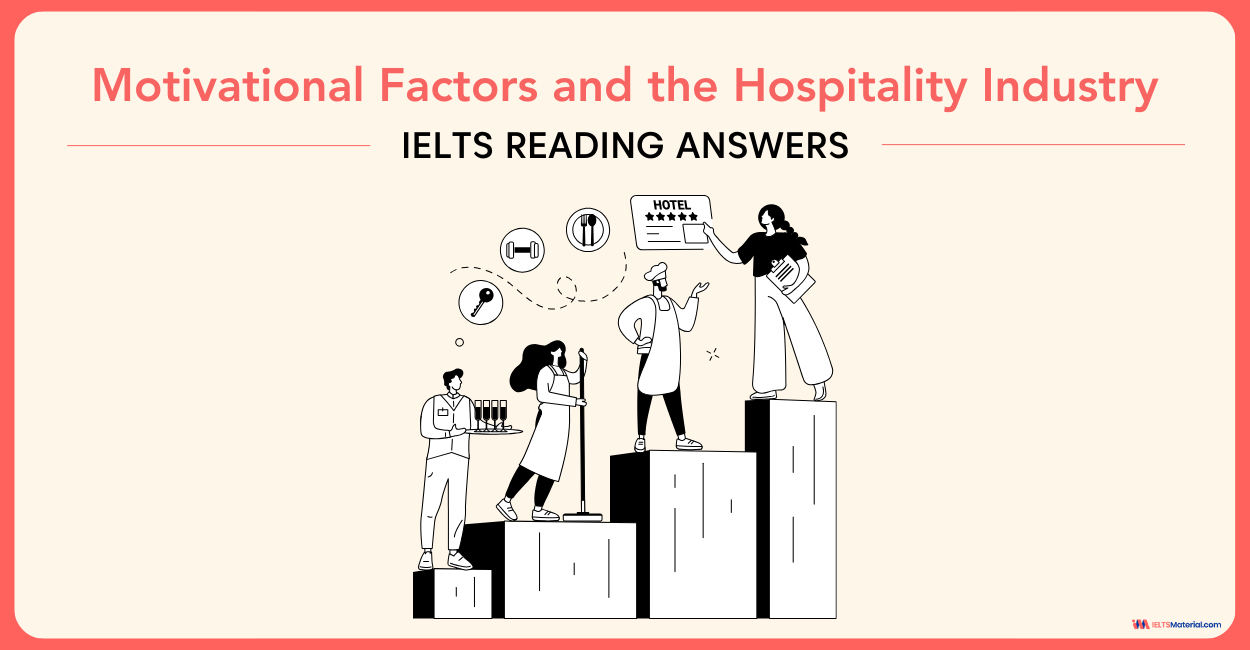Motivational Factors and the Hospitality Industry - IELTS Reading Answers
15 min read
Updated On
-
Copy link
Want to learn a few preparation tips for getting a band 8+ in the IELTS Reading? Check out the strategies for each question type as you prepare yourself with the passage, 'Motivational Factors and the Hospitality Industry' along with sample answers.
Table of Contents
- Types of Questions in Motivational Factors and the Hospitality Industry
- Band 8+ Strategies to Solve Questions in Motivational Factors and the Hospitality Industry
- Reading Passage - Motivational Factors and the Hospitality Industry
- Answers with Location and Explanation for Motivational Factors and the Hospitality Industry

Limited-Time Offer : Access a FREE 10-Day IELTS Study Plan!
Motivational Factors and the Hospitality Industry can help you get a higher band score of 8+ by practising with consistent practice. In order to achieve that, you must first understand different question types in the Reading Module. This is because you need to identify the type of question which is difficult for you to attend so that you can prepare accordingly. However, you need to practice on a regular basis to achieve a band 8+ in the IELTS Exam.
Ideally, you should not spend more than 20 minutes on a passage. You must scan the material for important terms, comprehend the subject, and then respond in accordance with the instructions. Also, keep some time to read the passage, pick out significant words, and recognise synonyms in order to provide a one-word response. Therefore, attending questions for different passages would enhance your skills and help you build confidence for the exam day.
So, why wait any longer? Let's start now!
Connect with our band 9 IELTS Trainers to crack your IELTS Reading in no time! Book a FREE Demo.
Types of Questions in Motivational Factors and the Hospitality Industry
The IELTS Academic Reading passage on, 'Motivational Factors and the Hospitality Industry', consists of 14 questions. Since the passages are longer, try to first check the types of questions which you will have to answer. This will stop you from wasting your time by reading the entire passage word by word. Not only that but you also need to do a targeted study so that you can focus on each question type while understanding how to answer them individually to avoid making any mistakes.
The question types found in this passage are:
- IELTS Reading Matching Features (Q. 1-5)
- IELTS Reading Yes, No, Not Given (Q. 6-9)
- IELTS Reading Summary Completion (Q. 10-14)
Band 8+ Strategies to Solve Questions in Motivational Factors and the Hospitality Industry
Since you now have the Motivational Factors and Hospitality Industry Reading Answer Key with explanation, it will be easier for you to identify the areas of improvement. However, it is important to know how to approach different question types before diving into the passage. This will help enhancing your reading speed and complete answering the questions within the given time limit. Let us check out some quick IELTS Exam Preparation Tips for Band Score of 8+ as you try to answer the two types of questions in the Reading Answers of Motivational Factors and Hospitality Industry.
- Read the questions and underline or circle keywords given in the question. This will help you find out where you would have to read and find later and also focus on how often every detail or name appears in the passage.
- Scan the passage so that you would look for the information given in the features and questions. With this, you will be able to find where the information is. However, read for the context and focus on the words surrounding the keywords.
- Don’t get confused in case the text has synonyms of the information that is originally present in the question. Remember that you need to improve by practising with the IELTS Vocabulary.
- Keep in mind that answers will not be in order as questions. Therefore, do not spend more time in finding one specific answer rather, you can move on to the next one and come back to the question later. Do NOT waste time if you are confused, especially for the Yes/No/Not Given type of questions. If the facts match, the answer is YES, and in case it doesn’t match, it is NO. If you are unable to find the answer or unsure of it, mark it NOT GIVEN.
- Read the instructions for the Summary Completion type of questions since you will have to write the answer within the specified word limit. You would not score if your answer do not follow the instructions given.
- Finding keywords are very crucial since it saves time for which you need to know How to Ace IELTS Reading with 'Keyword Technique'. This will help locate the information much faster.
- Make sure to cross-check all the answers so that you can be sure to choose the correct one. Do not assume any answer since it could affect your scores.
- Since there is no negative marking, it is advised to attempt all questions provided in the passage 'Motivational Factors and the Hospitality Industry'.
- Allocate around 20 minutes as you attempt the passage since Time Management for IELTS Reading is pivotal in the Reading Section.
Check the video below to be aware of the IELTS Reading Summary Completion Tips to achieve a band 8+.
Reading Passage - Motivational Factors and the Hospitality Industry
Motivational Factors and the Hospitality Industry
A A critical ingredient in the success of hotels is developing and maintaining superior performance from their employees. How is that accomplished? What Human Resource Management (HRM) practices should organizations invest in to acquire and retain great employees?
B Some hotels aim to provide superior working conditions for their employees. The idea originated from workplaces usually in the non-service sector that emphasized fun and enjoyment as part of work-life balance. By contrast, the service sector, and more specifically hotels, has traditionally not extended these practices to address basic employee needs, such as good working conditions.
C Pfeffer (1994) emphasizes that in order to succeed in a global business environment, organizations must make investment in Human Resource Management (HRM) to allow them to acquire employees who possess better skills and capabilities than their competitors. This investment will be to their competitive advantage. Despite this recognition of the importance of employee development, the hospitality industry has historically been dominated by underdeveloped HR practices (Lucas, 2002).
D Lucas also points out that ‘the substance of HRM practices does not appear to be designed to foster constructive relations with employees or to represent a managerial approach that enables developing and drawing out the full potential of people, even though employees may be broadly satisfied with many aspects of their work’ (Lucas, 2002). In addition, or maybe as a result, high employee turnover has been a recurring problem throughout the hospitality industry. Among the many cited reasons are low compensation, inadequate benefits, poor working conditions and compromised employee morale and attitudes (Maroudas et al, 2008).
E Ng and Sorensen (2008) demonstrated that when managers provide recognition to employees, motivate employees to work together, and remove obstacles preventing effective performance, employees feel more obligated to stay with the company. This was succinctly summarized by Michel et al. (2013): Providing support to employees gives them the confidence to perform their jobs better and the motivation to stay with the organization. Hospitality organizations can therefore enhance employee motivation and retention through the development and improvement of their working conditions. These conditions are inherently linked to the working environment.
F While it seems likely that employees’ reactions to their job characteristics could be affected by a predisposition to view their work environment negatively, no evidence exists to support this hypothesis (Spector et al, 2000). However, given the opportunity, many people will find something to complain about in relation to their workplace (Poulston, 2009). There is a strong link between the perceptions of employees and particular factors of their work environment that are separate from the work itself, including company policies, salary and vacations.
G Such conditions are particularly troubling for the luxury hotel market, where high-quality service, requiring a sophisticated approach to HRM, is recognized as a critical source of competitive advantage (Maroudas et al., 2008). In a real sense, the services of hotel employees represent their industry (Schneider and Bowen, 1993). This representation has commonly been limited to guest experiences. This suggests that there has been a dichotomy between the guest environment provided in luxury hotels and the working conditions of their employees.
H It is therefore essential for hotel management to develop HRM practices that enable them to inspire and retain competent employees. This requires an understanding of what motivates employees at different levels of management and different stages of their careers (Enz and Siguaw, 2000). This implies that it is beneficial for hotel managers to understand what practices are most favorable to increase employee satisfaction and retention.
I Herzberg (1966) proposes that people have two major types of needs, the first being extrinsic motivation factors relating to the context in which work is performed, rather than the work itself. These include working conditions and job security. When these factors are unfavorable, job dissatisfaction may result. Significantly, though, just fulflling these needs does not result in satisfaction, but only in the reduction of dissatisfaction (Maroudas et al., 2008).
J Employees also have intrinsic motivation needs or motivators, which include such factors as achievement and recognition. Unlike extrinsic factors, motivator factors may ideally result in job satisfaction (Maroudas et al, 2008). Herzberg’s (1966) theory discusses the need for a ‘balance of these two types of needs.
K The impact of fun as a motivating factor at work has also been explored. For example, Tews, Michel and Stafford (2013) conducted a study focusing on staff from a chain of themed restaurants in the United States. It was found that fun activities had a favorable impact on performance and manager support for fun had a favorable impact in reducing turnover. Their findings support the view that fun may indeed have a beneficial effect, but the framing of that fun must be carefully aligned with both organizational goals and employee characteristics. Managers must learn how to achieve the delicate balance of allowing employees the freedom to enjoy themselves at work while simultaneously high levels of performance’ (Tews et al., 2013).
L Deery (2008) has recommended several actions that can be adopted at the organizational level to retain good staff as well as assist in balancing work and family life. Those particularly appropriate to the hospitality industry include allowing adequate breaks during the working day, staff functions that involve families, and providing health and well-being opportunities.
Questions 1-5
Look at the following statements (Questions 1-5) and the list of researchers below.
Match each statement with the correct researcher, A-F.
Write the correct letter, A-F, in boxes 1-5 on your answer sheet.
NB You may use any letter more than once.
1 Hotel managers need to know what would encourage good staff to remain.
2 The actions of managers may make staff feel they shouldn’t move to a different employer.
3 Little is done in the hospitality industry to help workers improve their skills.
4 Staff are less likely to change jobs if cooperation is encouraged.
5 Dissatisfaction with pay is not the only reason why hospitality workers change jobs.
List of Researchers
A Pfeffer
B Lucas
C Maroudas et al.
D Ng and Sorensen
E Enz and Siguaw
F Deery
Questions 6-9
Do the following statements agree with the claims of the writer in the Reading Passage?
In boxes 6-9 on your answer sheet, write
YES if the statement agrees with the claims of the writer
NO if the statement contradicts the claims of the writer
NOT GIVEN if it is impossible to say what the writer thinks about this
6 One reason for high staff turnover in the hospitality industry is poor morale.
7 Research has shown that staff have a tendency to dislike their workplace.
8 An improvement in working conditions and job security makes staff satisfied with their jobs.
9 Staff should be allowed to choose when they take breaks during the working day.
Questions 10-14
Complete the summary below.
Choose ONE WORD ONLY from the passage for each answer.
Write your answers in boxes 10-14 on your answer sheet.
Fun at work
Tews, Michel and Stafford carried out research on staff in an American chain of 10…………. They discovered that activities designed for staff to have fun improved their 11…………,and that management involvement led to lower staff 12………..They also found that the activities needed to fit with both the company’s 13…………. and the 14…………… of the staff. A balance was required between a degree of freedom and maintaining work standards.
Searching for Exclusive IELTS Reading Content? Check out A Complete Package for IELTS Reading (General): Band 8 Self-Paced Preparation Course with An Improved IELTS General Reading Ebook | (April-June 2025)!
Answers with Location and Explanation for Motivational Factors and the Hospitality Industry
To achieve a higher IELTS Band Score, you need to attempt passages and also check the answers. In this way, you will be able to analyze your answers while looking at the explanation for the answers. With practice, you will develop reading skills and achieve a higher band score of 8+. Let's check out the answers with location and explanation for the passage, 'Motivational Factors and the Hospitality Industry'.
| Answer | Question Type | Answer Location | Answer Explanation |
| 1. E | Matching Features | Paragraph H, line 2 – line 3 | In the given location, it is given that “This requires an understanding of what motivates employees at different levels of management and different stages of their careers (Enz and Siguaw, 2000). This implies that it is beneficial for hotel managers to understand what practices are most favorable to increase employee satisfaction and retention.”. This shows that Enz and Siguaw in 2000 noted that hotel managers should know what practices would increase employee satisfaction and encourage good staff to remain. Hence, the answer is E (Enz and Siguaw). |
| 2. D | Matching Features | Paragraph E, line 1 | In the specified line, it is stated that “Ng and Sorensen (2008) demonstrated that when managers provide recognition to employees, motivate employees to work together, and remove obstacles preventing effective performance, employees feel more obligated to stay with the company.”. This shows that in 2008, Ng and Sorensen opined that the actions of managers, like offering recognition, may make staff feel they shouldn’t move to a different employer (feel more obligated to stay with the company). Hence, the answer is D (Ng and Sorensen). |
| 3. B | Matching Features | Paragraph D, line 1 | In the mentioned line, it is given that “Lucas also points out that ‘the substance of HRM practices does not appear to be designed to foster constructive relations with employees or to represent a managerial approach that enables developing and drawing out the full potential of people…”. It can be concluded that Lucas points out that HRM practices do little in the hospitality industry to help workers improve their skills and work at their full potential. Hence, the answer is B (Lucas). |
| 4. D | Matching Features | Paragraph E, line 2 | In the fifth paragraph, it is specified that “Providing support to employees gives them the confidence to perform their jobs better and the motivation to stay with the organization.”. In other words, as Michel et al. summarize the words of Ng and Sorensen, if the managers provide support and cooperation, the employees will be motivated to stay with the same company (less likely to change jobs). Hence, the answer is D (Ng and Sorensen). |
| 5. C | Matching Features | Paragraph D, line 2 – line 3 | In the above-mentioned paragraph, it is stated that “In addition, or maybe as a result, high employee turnover has been a recurring problem throughout the hospitality industry. Among the many cited reasons are low compensation, inadequate benefits, poor working conditions and compromised employee morale and attitudes (Maroudas et al, 2008).”. It can be pointed out that Maroudas et al. believe that apart from pay dissatisfaction (low compensation), working conditions and low morale are factors why hospitality workers change jobs. Hence, the answer is C (Maroudas et al.). |
| 6. Yes | Yes/No/Not Given | Paragraph D, line 3 | Through a reference line like, “Among the many cited reasons are low compensation, inadequate benefits, poor working conditions and compromised employee morale and attitudes (Maroudas et al, 2008).”, it can be concluded that the statement -One reason for high staff turnover in the hospitality industry is poor morale- agrees with the information in the passage. Hence, the answer is Yes. |
| 7. No | Yes/No/Not Given | Paragraph F, line 1 | In the cited location, it is stated that “While it seems likely that employees’ reactions to their job characteristics could be affected by a predisposition to view their work environment negatively, no evidence exists to support this hypothesis (Spector et al., 2000).”. Based on this reference, it can be concluded that even though it is likely to be believed that employees have a tendency to dislike their workplace, no research or evidence supports this belief. As the statement contradicts the claims of the writer, the answer is No. |
| 8. No | Yes/No/Not Given | Paragraph E, line 1 | In the provided line, it is said that “Ng and Sorensen (2008) demonstrated that when managers provide recognition to employees, motivate employees to work together, and remove obstacles preventing effective performance, employees feel more obligated to stay with the company.”. This points out that there are other factors like recognition and removing obstacles that are important to make staff satisfied and stick to their jobs. As the statement contradicts the claims of the writer, the answer is No. |
| 9. Not Given | Yes/No/Not Given | NA | Although it is mentioned that staff should be allowed to take adequate breaks to maintain work-life balance in the last paragraph, there is no information regarding staff being allowed to choose when they take breaks during the working day. Hence, the answer is Not Given. |
| 10. restaurants | Summary Completion | Paragraph K, line 2 | In the specific line, it is mentioned that “Tews, Michel and Stafford (2013) conducted a study focusing on staff from a chain of themed restaurants in the United States.”. In other words, it can be said that Tews, Michel and Stafford carried out (conducted) research (study) on staff in an American (the United States) chain of restaurants. Hence, the answer is ‘restaurants’. |
Unlock Explanations
If you want to have a look at the remaining explanations, sign up!
| 11. performance | Summary Completion | Paragraph K, line 3 | In Paragraph K, it is stated that “It was found that fun activities had a favorable impact on performance…”. This statement indicates that Tews, Michel and Stafford found out that activities designed for staff to have fun improved their performance (had a favorable impact). Hence, the answer is ‘performance’. |
| 12. turnover | Summary Completion | Paragraph K, line 3 | The given line specifies that “ …manager support for fun had a favorable impact in reducing turnover. ”. It is indicated that the research pointed out that management involvement (manager support for fun) led to lower (a favorable impact) staff turnover. Hence, the answer is ‘turnover’. |
| 13. goals | Summary Completion | Paragraph K, line 4 | In the paragraph, it is given, “Their findings support the view that fun may indeed have a beneficial effect, but the framing of that fun must be carefully aligned with both organizational goals and employee characteristics.”. This reference proves that the fun activities should be prepared/aligned to the organization’s goals. Hence, the answer is ‘goals’. |
| 14. characteristics | Summary Completion | Paragraph K, line 4 | In the cited line, it is written that “Their findings support the view that fun may indeed have a beneficial effect, but the framing of that fun must be carefully aligned with both organizational goals and employee characteristics.”. It can be concluded that the fun activities of the restaurants should be in alignment with the organization’s goals and employee characteristics. Hence, the answer is ‘characteristics’. |
Enroll into our Free IELTS Webinar and learn more about techniques to improve your reading speed.
Well done looking at the passage on 'Motivational Factors and the Hospitality Industry'. Continue practising by using different test papers on various topics which will help you improve your reading skills. Focus on attending different question types so that you are aware of the strategies to be used for each one of them. This will help in building confidence and make you feel at ease while attempting to answer the questions given. By preparing consistently, you will be able to achieve a band score of 8+.
Check More Reading Passages
|
Animal Minds: Parrot Alex, Developing Courtiers, Classifying Societies Reading Answers |
Smoke Alarms in the Home & Sydney Opera House Tours - IELTS Reading Answers |
Also Check :
Practice IELTS Reading based on question types

Start Preparing for IELTS: Get Your 10-Day Study Plan Today!
Explore other Reading Practice Tests

Nehasri Ravishenbagam

Kasturika Samanta

Kasturika Samanta
Recent Articles

Nehasri Ravishenbagam

Haniya Yashfeen

Haniya Yashfeen

Haniya Yashfeen





Post your Comments